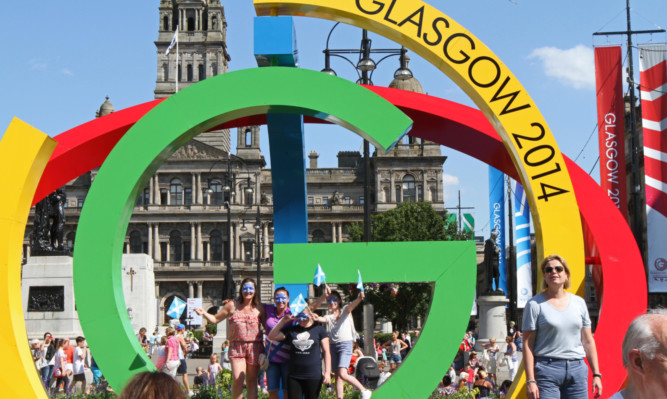
The Commonwealth Games are likely to generate in excess of a BILLION pounds for the Scottish economy it was revealed last night.
Industry experts predict Scotland will benefit from an economic bounce for years to come as a result of its resounding success.
Tourism and business chiefs believe the Games, which have showcased Glasgow to the world, will lead to an extra 400,000 visitors coming to Scotland every year. The influx of tourists is expected to bring in almost £100 million extra a year for hotels and businesses as visitors splash out during their stays. The country, and Glasgow in particular, is also expected to have raked in close to £100 million during the spectacle alone.
It all adds up to a welcome billion pound bounce following one of the most severe economic downturns in history.
Restaurants, cafes and bars around venues and transport hubs have been the biggest winners as hungry spectators looked to relax between events.
Glasgow will also benefit for decades as a result of the huge amounts of money pumped into improving transport links and sporting venues across the city.
Stuart Patrick, Chief Executive of Glasgow Chamber of Commerce, said the city has welcomed at least half a million visitors as part of the games, injecting millions into the economy.
He said: “We believe about 500,000 people from outside Scotland bought tickets for the games, but many more will have come to the city for the cultural events and business meetings without having bought tickets.
“Footfall is miles up. Last week alone it was four times what it normally is. It’s a welcome boost for the economy of Glasgow and Scotland as a whole.
“There’s no doubt it will have brought in the upper end of tens of millions of pounds to the economy and that’s a conservative estimate. We won’t have figures on the income till later this month but it’s very exciting.”
And while the immediate injection of cash is a welcome boost, business leaders expect the long-term benefits to be just as good.
Mr Patrick added: “We expect visitor numbers to go from 2.2 million a year to 2.6 million a year following the Games. That should see income rise from £580 million to £670 million a year. If that happens we’ll be more than happy.”
Huge parts of Glasgow were also transformed in preparation for the Games. The East End of the city saw the construction of the Sir Chris Hoy Velodrome and the Athletes’ village, which will later be turned into social and private housing.
The city has also benefitted from a £700 million extension to the M74 and a £50 million investment in railway stations and subways, which makes Glasgow more attractive to businesses. Tourism body VisitScotland said the economic boost from the Games will be followed by the Ryder Cup in September, bringing yet more money into the country through visitors.
It’s been estimated that two thirds of the 250,000 spectators expected at the golfing championship will be from the rest of the UK or overseas.
Malcolm Roughead, Chief Executive of VisitScotland, said: “Since the Games’ opening ceremony, Glasgow has welcomed hundreds of thousands of visitors, while a global audience of over a billion people have been tuning in to watch the action.
“This has been a golden opportunity to show the world that Scotland has the skills, infrastructure and most of all the people to deliver world-class events to the highest of standards.
“Hosting The Ryder Cup in September will not only translate into direct benefits for golf tourism in Scotland, but also to the wider tourism industry.
“Due to the central location of Gleneagles, the impact of hosting this incredible event will not only be felt in Perthshire, but right across Scotland.
“Benefits to Scottish tourism include not only the accommodation sector, but also travel and transport, Scottish food and drink suppliers, attractions and a wide range of businesses throughout the industry.
“These events are vital if we want to attract more visitors to Scotland, create new jobs and boost the economy.
“Tourism is one of the country’s most important industries we must use major events, like the Commonwealth Games and The Ryder Cup, as a springboard for economic success in the future.”

Enjoy the convenience of having The Sunday Post delivered as a digital ePaper straight to your smartphone, tablet or computer.
Subscribe for only £5.49 a month and enjoy all the benefits of the printed paper as a digital replica.
Subscribe